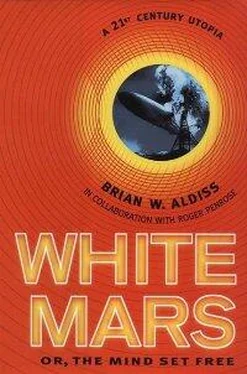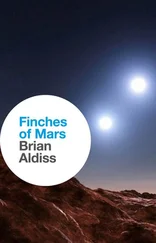Brian Aldiss - White Mars
Здесь есть возможность читать онлайн «Brian Aldiss - White Mars» весь текст электронной книги совершенно бесплатно (целиком полную версию без сокращений). В некоторых случаях можно слушать аудио, скачать через торрент в формате fb2 и присутствует краткое содержание. Год выпуска: 1999, ISBN: 1999, Издательство: Little, Brown UK, Жанр: Фантастика и фэнтези, на английском языке. Описание произведения, (предисловие) а так же отзывы посетителей доступны на портале библиотеки ЛибКат.
- Название:White Mars
- Автор:
- Издательство:Little, Brown UK
- Жанр:
- Год:1999
- ISBN:0-316-85243-0
- Рейтинг книги:5 / 5. Голосов: 1
-
Избранное:Добавить в избранное
- Отзывы:
-
Ваша оценка:
- 100
- 1
- 2
- 3
- 4
- 5
White Mars: краткое содержание, описание и аннотация
Предлагаем к чтению аннотацию, описание, краткое содержание или предисловие (зависит от того, что написал сам автор книги «White Mars»). Если вы не нашли необходимую информацию о книге — напишите в комментариях, мы постараемся отыскать её.
White Mars — читать онлайн бесплатно полную книгу (весь текст) целиком
Ниже представлен текст книги, разбитый по страницам. Система сохранения места последней прочитанной страницы, позволяет с удобством читать онлайн бесплатно книгу «White Mars», без необходимости каждый раз заново искать на чём Вы остановились. Поставьте закладку, и сможете в любой момент перейти на страницу, на которой закончили чтение.
Интервал:
Закладка:
She sighed. “Beau’s here with me, Tom. He’s sleeping. He does not feel Chimborazo’s presence as I do. Oh, we’re so limited … Maybe its unity is proof of a greater understanding. Something gained through the chilly expanses of time—what we comprehend as time, anyway—until it has reached perfect knowledge and wisdom. Does that sound like wishful thinking?” She laughed at herself.
“Suppose it was like that, Kathi. Would we be able to converse with it? Communicate? Or would its understandings put it for ever beyond our conceptual reach? ‘What we comprehend as time’—there’s an example … So it’s to us a kind of god—totally without interest in anything outside itself.”
“I wouldn’t be too sure of that…”
She put her hands to her cheeks in a gesture I had seen her use before. “It’s that time of night when imaginations run away with themselves. Could be it’s just a freak mollusc, stranded on a failed planet that long since yielded up its essence … Tom, go to sleep! I wish I were there to talk to you, closely…”
Her face faded and was gone.
I could not sleep. The conversation lingered in my mind. My head ached; I felt stifled.
I staggered out of my chamber in search of company, and barged without knocking into Choihosla’s apartment.
Youssef Choihosla was kneeling on a small mat, his forehead to the floor. A dim lamp stood nearby.
I halted in the doorway. Choihosla looked up with a brow of thunder. He began a stream of abuse, biting it off when he recognised me.
“Tom? You look ghastly! Come in, come in. What’s up? It’s ‘X’ hour.”
He rose as I entered. I said, “You were in the midst of prayer. I’m sorry to break in.”
“Allah is great. He will forgive an interruption. Come and sit down.”
I sat weakly and he brought his great bulk close and also sat, hands on knees. I spoke of my confusion of mind, brought about by the thought of the unknown life form not far away from us. He confessed that his prayer—“largely wordless”—had been seeking reassurance for the same reason.
We talked for a long while, merely speculating.
My curiosity got the better of me. I saw an electronic gadget with a small screen, at present blank, lying on the floor by Choihosla’s prayer mat, and asked him what it was.
He hesitated, then picked it up and presented it to me for my inspection.
Pressing a button, I set golden bodies in motion on the screen, while figures jerked across the lower section of it.
This was a Muslim ephemeris. It calculated the positions, not only of the Sun, the Moon, Earth and Mars, but also of Mecca, throughout the year. It enabled Choihosla to pray towards the holy city when the revolutions of Earth brought Mecca to a point facing towards Amazonis, where our structures were situated. Choihosla explained that it was considered poor theology to pray when Mecca was on the other side of Earth’s globe, facing away from Mars.
“Well, it’s ingenious,” I remarked. He hefted the little calculator in the palm of his hand. “You buy these ephemerises for a few cents in the bazaars,” he said, offhandedly. “Of course, it’s a Western invention…”
Seeing the puzzlement in my eyes, he said, “You wonder about my faith—maybe how I persist in it? Don’t you need something bigger than yourself in life?”
I pointed in what I imagined to be the direction of Olympus Mons.
“It’s out there,” I said.
Monstrous things apart, we came to realise nothing could be achieved without decent living conditions. The thinness of the atmosphere of Mars rendered us susceptible to meteoritic bombardment, as we had been well aware. We now set about extending our quarters by excavation, creating a new subterranean level where the apartments had rooms larger than those in our previous quarters. These apartments had balconies and galleries; the bricks we fabricated were glazed in various colours, while genetically altered plants—in particular creepers—were planted and flourished under artificial light. Rooms were decorated in various bright colours and afforded better opportunities for solitude.
I found a glowing message waiting on my Ambient. When I punched Receive, Charles Bondi’s voice came to me, full of controlled anger: “Jefferies, what are you people doing over there? Why do you think our research unit was positioned on Mars? It was because we required complete silence and no vibrations, wasn’t it? Our foundation represents the whole reason for habitation on this planet. Your drillings are threatening our search for the Omega Smudge. We’re getting strange readings. I have to tell you that all drillings and excavations must cease at once. Immediately. Please acknowledge that this has been done.”
I froze his face. Studying it, I did not see the aggression implied by his words.
My reply was brief. “Charles, I am sorry we upset your solitude. But so far your researches have produced nothing. Meanwhile we have to live. This is why our spicules were sited at a distance from your foundation. We shall be finished within a few days. I have no intention of failing to complete what will be new much required living quarters, and I invite you to inspect them when you have recovered from your annoyance.”
He sent a one-word reply, “Luddite!” Then we heard no more of the matter. While marvelling at scientific arrogance, I saw its necessity and urged the workers to press on as speedily as possible, to get the vibration over and done with.
As the plans for our Utopia came nearer to realisation, so discussions on the employment and containment of power became more urgent. In what sort of context would an autocratic temperament like Bondi’s be content? How could the admirable restlessness of enquiry be satisfied by a Utopian calm? How could our Utopia maintain both stability and change? These were some of the questions that confronted us.
We debated the nature of power and the striving for power. Eventually it was Choihosla who suggested that we should question our concept of power itself.
He began by asking us a riddle. Who is it who holds most power of life and death over another?
Answers from the floor included an executioner, an army sergeant in the heat of battle, a murderer, the chief of a savage tribe, the launcher of nuclear missiles, and (mischievously) a scientist.
Choihosla shook his head. “The answer is—a mother over her newborn child. Bear that in mind while I speak to you.”
He said he realised his proposals would be anathema to all whose brains had been, as he put it, “dissolved by the Western way of life”. But a little thought was needed on the matter and that thought must be directed to overturning accepted ideas of power as an opportunity for gain.
The various presidents, monarchs and dictators who wielded power Downstairs were not to be emulated Upstairs. All of them sought to accumulate wealth for themselves. The citizens under them also sought to accumulate wealth for themselves. We, fortunately, had no wealth. Nevertheless we would need a leader, a man or a woman, to whom all questions of justice could eventually be referred. He suggested this person should assume the title of Prime Architect. The title was neutral as regards gender, and it correctly implied that something constructive was going on.
But the conception of power as a force that enabled an individual to gain more than was his or her due had to be discarded. Power had to derive from the determination to achieve and maintain a well-organised society. Since this determination would be reinforced by the hope—however illusory—of achieving the perfectability of humanity, it would follow that the powerless would not be harmed by power, any more than a child is harmed by the mother’s power over him. Indeed, the linkages of power, from officials to parents, to children, to pets, would share by example the unifying hope of a general well-being. Both child and mother benefit by the maternal wielding of power.
Читать дальшеИнтервал:
Закладка:
Похожие книги на «White Mars»
Представляем Вашему вниманию похожие книги на «White Mars» списком для выбора. Мы отобрали схожую по названию и смыслу литературу в надежде предоставить читателям больше вариантов отыскать новые, интересные, ещё непрочитанные произведения.
Обсуждение, отзывы о книге «White Mars» и просто собственные мнения читателей. Оставьте ваши комментарии, напишите, что Вы думаете о произведении, его смысле или главных героях. Укажите что конкретно понравилось, а что нет, и почему Вы так считаете.










